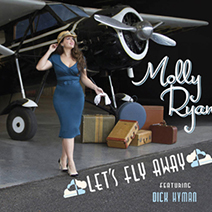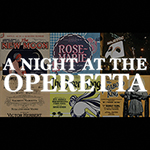Molly Ryan
Let’s Fly Away
September 4, 2015
Reviewed by Alix Cohen for Cabaret Scenes
 “Let’s Fly Away takes you on a musical journey around the world in sixty minutes” —Dan Levinson’s liner notes—implies that this CD pinballs from one geography to the next. In fact, it’s an ode to the urge to travel, stopping at some distinctive locales. Arrangements (by Levinson and Dan Barrett) are engaging, textural, and authentic to spirit with more than a few successfully upending familiarity. Musicianship is flat out terrific.
“Let’s Fly Away takes you on a musical journey around the world in sixty minutes” —Dan Levinson’s liner notes—implies that this CD pinballs from one geography to the next. In fact, it’s an ode to the urge to travel, stopping at some distinctive locales. Arrangements (by Levinson and Dan Barrett) are engaging, textural, and authentic to spirit with more than a few successfully upending familiarity. Musicianship is flat out terrific.
Molly Ryan has a naturally creamy voice with back-end vibrato that can leave an airy trail of skywriting or curl back on itself like cursive. It’s clear the artists involved with this effort “get” and appreciate the period material, which is both well chosen and well sequenced for listening pleasure. Some highlights follow:
“Far Away Places” (Alex Kramer/Joan Whitney) is utterly lovely, filled with wistful longing, yet not tenuous. Showcasing eloquent phrasing, Ryan utilizes both the start/stop sigh of “In a book-that I took-from the shelf” and a legato “whenever I hear the whistle….” John Reynolds’s deft guitar adds to the white dinner jacket/country club feel.
“Flying Down to Rio” (Gus Kahn/Edward Eliscu/Vincent Youmans; additional lyrics Dan Levinson) is so infectiously dancey and blithe, my shoulders move as I write. Percussion lightly stimulates quick steps and swinging hips. Ryan’s vocal is nimble and bright, embodying the number’s throwaway charm. Tie your wagon to this one for fun.
What do they do on…“A Rainy Night in Rio”? (Leo Robin/Arthur Schwartz), which also takes us to “Mississippi when the skies are drippy” and “Albuquerque when it’s murky,” is flirty. Lyrics circle, dip and slide. The song winks.
“South Sea Island Magic” (Lysle Tomerlin/Andy Iona Long), popularized by Bing Crosby in his Royal Hawaiian days, is a languid hula with an undulating vocal that exits in a stage whisper. Usually performed as camp, the song comes off tender and true to its origin. Another such choice is a party-starting rendition of “On the Road to Morocco” (Johnny Burke/Jimmy Van Heusen, from the 1942 Crosby/Hope film) sung in duet with Bria Skonberg (who also plays a mean trumpet). While never actually mugging, Levinson’s arrangement and the ladies’ effervescent harmony create broad vaudeville overtones replete with a hoochie-coochie passage at the end. (These two should sing together more often.)
“Sous le ciel de Paris” (“Under Paris Skies”) (Jean Drejac/Kim Gannon/Hubert Giraud from the 1951 film) is beautifully under-produced. Adrien Chevalier’s splendid violin manifests Django Reinhardt attitude, while John Reynold’s delicious whistling evokes Mistinguett. This may be the best up-tempo version I’ve heard of the song since Reinhardt’s. Ryan sings in luscious, smile-inducing English and French.
“Trav’lin All Alone” (J.C. Johnson), one of the few dark selections, was a Billie Holiday cut. Despite mid-tempo performance, Ryan manages to deliver a tired-to-my-soul cadence plumbing the lyrics for a stuck-in-Limbo feel. Its arrangement, though not blues, conjures the back room of a bar at 3:00 am: empty glasses, leftover ribs, overflowing ashtrays, a white evening scarf, a few escaped feathers, an overturned chair.
“Anywhere I Wander” (Frank Loesser from Hans Christian Andersen) is an entire playlet. Levinson’s innovative arrangement starts like the original ballad, segues into winsome, soft-focus swing, then swells (still swing) to practiced resolve. Ryan’s vocal briefly stops momentum, first touching, then with open-throated conviction. Skilled and original.





